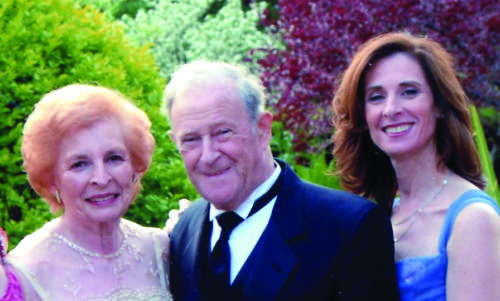
Ellen Bachner Greenberg, a Scardale-based life coach, clearly remembers the first time she saw the Holocaust documentary, Night and Fog. She was 10-years-old, and tried to avert her eyes from the screen, which featured raw footage from the concentration camps.
All she saw were emaciated bodies and mass grave pits and she knew that both of her parents were Holocaust survivors who had endured unbelievable hardships. Greenberg recently spoke about her father, Fred, at Congregation B’nai Yisrael Synagogue (CBY) in Armonk as part of an initiative called GenerationsForward launched by the White Plains-based group The Holocaust and Human Rights Education Center (HHREC).
GenerationsForward was created two years ago. Members of the group are either 2nd or 3rd generation, meaning that they have a connection to the Holocaust through their parents or grandparents. All members participate in an 18-week workshop called ‘Safekeeping Stories’ which helps them learn how to “tell their family’s Holocaust story in a powerful yet concise manner that is suitable for school aged children as well as adult groups,” said Millie Jasper, HHREC’s Executive Director.
Members have had about 20 speaking engagements at synagogues, public and private schools as well as civic groups. Many of the speaking engagements including Greenberg’s coincided with Yom Hashoah, the annual Holocaust Remembrance Day in late April. Jasper said HHREC has received increased requests for speakers from local middle schools and high schools who have seen anti-Semitism or other hateful acts within their schools.
Greenberg’s father Fred was born in Berlin in 1925. Greenberg’s speech was interspersed with photos and video of her father who had participated in The Shoah Foundation’s taped video interviews with Holocaust survivors years ago. In 1935, Fred’s family was stripped of German citizenship as part of the Nuremberg laws and eventually exiled to Chrzanow, Poland when he was 15 years old. Everyone was forced to work and Fred eventually found a job delivering soda and beer to German Army posts, restaurants and even Trzebina, a labor camp.
In 1943, Chrzanow was evacuated by the Nazis and Fred was sent to a concentration camp. He eventually spent time in several concentration camps including Dachau and endured death marches.
Although Greenberg knew that her father had participated in the Shoah Foundation’s project she refused to watch the videotapes. “Those tapes were just too personal and painful for me,” but she had a change of heart following the death of Elie Weisel, an author who wrote prolifically about the Holocaust. When Greenberg initially watched the video footage of her father, she was struck by how many times he used the word ‘lucky.’ “I survived on hope,” he said in the video. Greenberg always marveled at her father’s optimism, perseverance and positive attitude that helped him rebuild a life in America.
Remarkably, Fred was reunited with his brother in Dauchau. His mother did not survive the war. In 1945, Fred and his brother were transported in a railroad car from Dachau that was eventually ambushed by English fighter planes. Fred and his brother decided to jump from the train and they did successfully escaping to freedom.
After the war, Fred and his brother lived in a displaced person camp in Munich. They also decided to return to Berlin where they reunited with their father. The family then immigrated to Washington Heights in Manhattan, an area that at the time was populated with many Holocaust survivors. Fred eventually found work as an automechanic and met Greenberg’s mother Ruth at a Hanukah party in 1951. Ruth also was a Holocaust survivor and had spent her time during the war in Belgium hidden in a convent.
The Bachners ultimately settled in Hartsdale, an area where very few survivors lived but Fred never forgot the experiences of his past. He was very involved in his temple, the Greenburgh Hebrew Center, and often retold his story at other HHREC events. Even prior to his death in 2008, he had purchased a marker for his tombstone that said Holocaust survivor.
Greenberg retold how her life in Hartsdale was a typical post-war suburban upbringing but there were “subtle ways” that her parents’ past was different from her peers. For example, every Thanksgiving her parents would steadfastly refuse to serve sweet potatoes because it reminded them of how they had survived on spoiled potatoes during the war, which eventually turn sweet when rancid.
Greenberg recounts how her father also fought Multiple Sclerosis and leukemia in his old age but whenever she called to speak to him, his reply was always the same. “What could be bad? The sun is out and the sky is blue.”
Other GenerationsForward speakers will be recounting their parents and grandparents stories in lectures throughout the county this year. For a list of speakers and upcoming events, visit www.hhrecny.org.
Stacey Pfeffer is a frequent contributor to The Inside Press; she has written several articles on the Holocaust.
